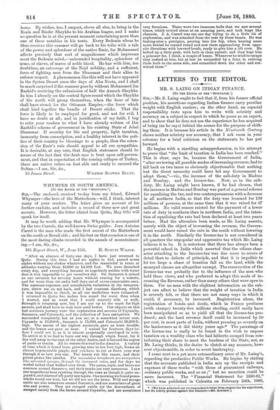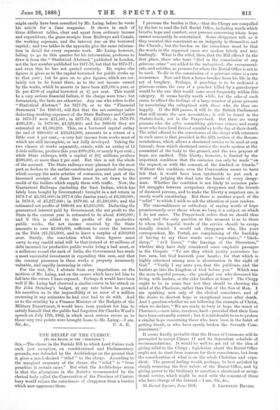LETTERS TO THE EDITOR.
MR. S. LAING ON INDIAN FINANCE.
[To THE EDITOR OF THE "SPECTATOR.")
Sra,—Mr. S. Laing ought to feel that if, from his former official position, his assertions regarding Indian finance carry peculiar weight with English readers ; on the other hand, an especial responsibility rests upon him to write with sobriety and accuracy on a subject in respect to which he poses as an expert, and to show that he does not use the experience he has acquired of being (as he says) behind the scenes for the purpose of shift- ing them. It is because his article in the Nineteenth Century shows neither sobriety nor accuracy, that I ask room in your columns for a brief criticism on the statements he has put forward.
He begins with a startling misapprehension, in his attempt to prove that "the limit of taxation in India has been reached.' This is clear, says he, because the Government of India, " after reviewing all possible modes of increasing revenue, had to fall back on two taxes so obviously objectionable that nothing but the direst necessity could have led any Government to adopt them,"—viz., the increase of the salt-duty in Madras and Bombay, and the licence-tax. Now, as to the salt- duty, Mr. Laing might have known, if he had chosen, that the increase in Madras and Bombay was part of a general scheme for equalising the tax, and was contemporaneous with a decrease in all northern India, so that the duty was lessened for 130 millions of persons, at the same time that it was raised for 47 millions. No valid reason existed for the payment of a lower- rate of duty in southern than in northern India, and the inten- tion of equalising the rate had been declared at least two years before. Had the alteration been made, as Mr. Laing asserts,. merely with the object of increasing the revenue, the Govern- ment would have raised the rate in the south without lowering it in the north. Similarly the licence-tax is not considered in all quarters the unpopular and oppressive tax which Mr. Laing- believes it to be. It is notorious that there has always been a powerful school in India which asserted that the odious char- acter attaching to the Income-tax was due more to errors of detail than to defects of principle, and that it is impolitic to- let too large a :share of taxation fall on the land, while the- moneyed classes are altogether exempt. The resurrection of the licence-tax was probably due to the influence of the men who. held these views, and who preferred to adopt this mode of in- creasing the Revenue, rather than many others that were open to them. For no man with the slightest information on the sub- ject can affect to believe that the weight of taxation in India. is severely felt, or that there are not many ways in which it could, if necessary, be increased. Registration alone, the- registration of bonds and deeds, which in France produces (with stamps) twenty-five millions sterling, could easily have been manipulated so as to yield all that the license-tax pro- duced; and the land revenue itself could be increased by 50- per cent. in most parts of India, without pressing as severely on the landowners as it did thirty years ago.* The parentage of the license-tax is really to be found in the wish to impose taxation on a wealthy class who had hitherto escaped from con- tributing their share to meet the burdens of the State, not, as Mr. Laing thinks, in the desire to clutch at any measure, how- ever objectionable, in order to avert bankruptcy.
I come next to a yet more extraordinary error of Mr. Laing's, regarding the productive Public Works. He begins by stating that the accounts published in India mix up the receipts and expenses of these works " with those of guaranteed railways, ordinary public works, and so on ;" but no assertion could be more incorrect. The " Financial Statement for 1880.81," which was published in Calcutta on February 24th, 1880,
* [We base admitted oar correspondent's letter from respect for his experience. but we utterly protest against this sentenoe.--Ign. Spectatorj
might easily have been consulted by Mr. Laing, before he wrote his article for a June magazine. It shows in each of three different tables, clear and apart from ordinary income and expenditure, the gross receipts from Railways and Canals, the working expenses, and the interest due on the borrowed capital ; and two tables in the appendix give the same informa- tion in detail for every separate work. Mr. Laing, however, failing to go to this quarter for his information, professes to draw it from the " Statistical Abstract," published in London, not the last number published for 1877-78, but that for 1876-77 ; and even this he has not quoted correctly. He copies -the figures it gives as to the capital borrowed for public works up to that year ; but he goes on to give figures, which are cer- tainly not to be found there, as to the net income earned by the works, which he asserts to have been £21,000 a year, or 2s. per £100 of capital borrowed at 41- per cent. This would be a very serious financial failure, if the charge were true; but fortunately, the facts are otherwise. Any one who refers to the ' Statistical Abstract " for 1877-78, or to the "Financial Statement " for 1880-81, will find that the net earnings (after deducting working expenses) of the State Railways and Canals in 1876-77 were £71,563; in 1877-78, £252,069; in 1878-79, £695,138 ; in 1879-80, £1,329,400; and for 1880-81 they are estimated at £1,586,200. This, on a borrowed capital outlay • (to end of 1880-81) of £39,212,000, amounts to a, return of a little over 4 per cent.,—a very fair income from works most of -which are still incomplete, or not fully developed. Taking the two classes of works separately, canals, with an outlay of 12 2-3rds millions, produce this year £990,200, or nearly 8 per cent. ; while State railways, with a capital of 261 millions, produce £596,000, or more than 2 per cent. But this is not the whole -of the account. The State railways were planned for the most part as feeders to the earlier-constructed guaranteed railways, which occupy the main arteries of commerce, and part of the increased receipts of those lines must be set down to the -credit of the feeders which supply them with traffic. Now, the Guaranteed Railways (including the East Ind'sn, which has lately been bought by Government) brought in a net return in 1876-7 of £5,361,000 ; in 1877-8 (the famine year), of £6,560,000 ; in 1878-9, of £5,277,000; in 1879-80, of £5,180,000; and the • estimated net profits of 1880-81 are £5,645,000. Deducting the guaranteed interest paid by Government, the net profit to the State in the current year is estimated to be about 2500,000 ; and if this is added to the profits of the productive public works, the net income received by the State amounts to over £2,000,000, sufficient to cover the interest -on the Debt (R1,725,000), and to leave a surplus of £300,000 -over. Surely, the conviction which these figures must carry to any candid mind will be that instead of 40 millions of -debt incurred for productive public works being a bad asset, or .a millstone round the neck of India, the Government has made a most successful investment in expending this sum, and that the country possesses in these works a property immensely valuable, and rapidly increasing in value.
For the rest, Sir, I abstain from any imputations on the motives of Mr. Laing, and on the causes which have led him to fall into the errors I have exposed. Perhaps it would have been well if Mr. Laing had observed a similar course in his attack on Sir John Strachey's budget, at any rate before he penned his assertion as to the impossibility of an error of a million -occurring in any estimates he had ever had to do with. And as to the scrutiny by a Finance Minister of the Budgets of the Military Department, it would have been prudent for him to -satisfy himself that the public had forgotten Sir Charles Wood's speech on July 17th, 1862, in which most serious errors as to those very two points were brought home to Mr. Laing.—I am,



































 Previous page
Previous page